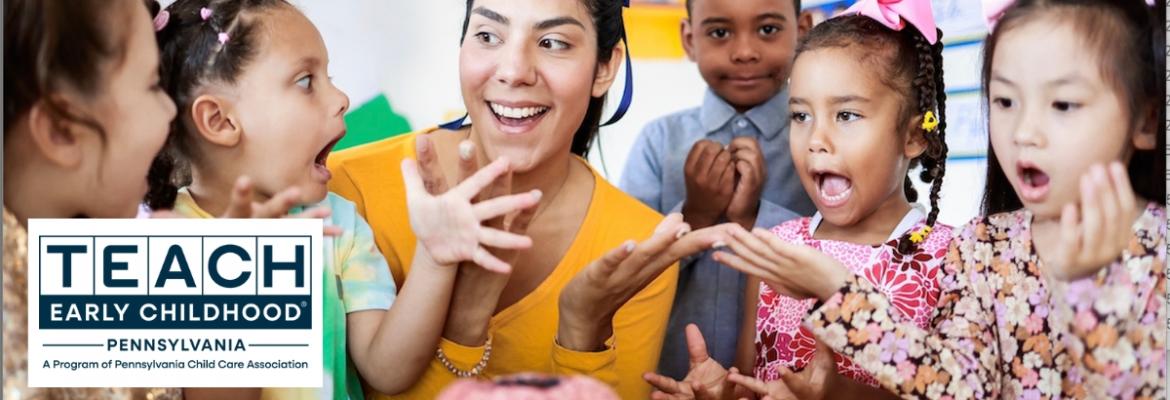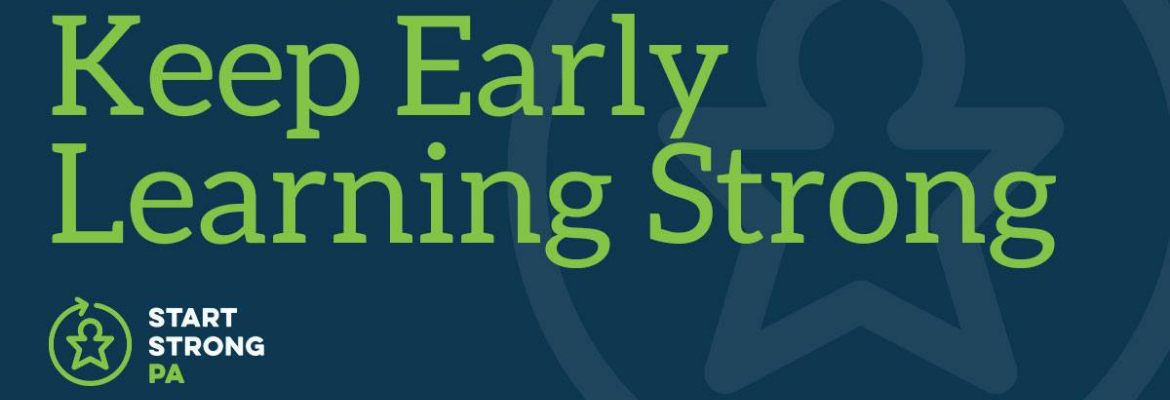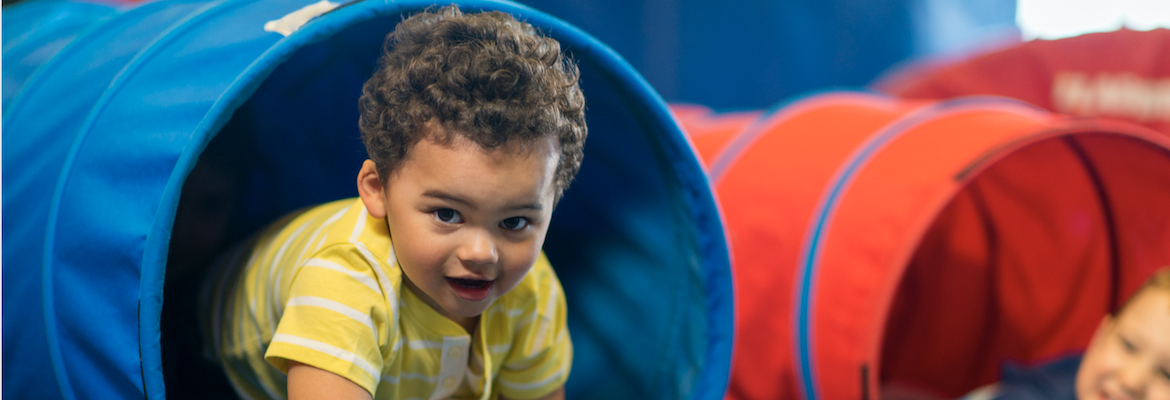State Policy & Budget Issues
Early Care & Education Funding
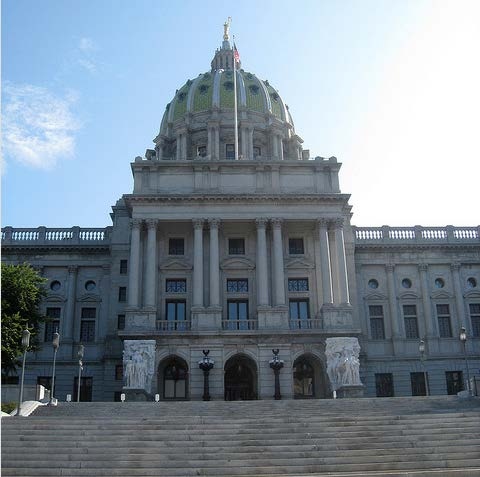 Pennsylvania uses a mix of state and federal funds to administer its early learning system. Typically, the first Tuesday after the first Monday in February, the Governor proposes a budget for the next fiscal year. The General Assembly reviews and proposes a version that, in collaboration with the Administration, becomes the foundation for Pennsylvania's fiscal and policy agenda for the next year.
Pennsylvania uses a mix of state and federal funds to administer its early learning system. Typically, the first Tuesday after the first Monday in February, the Governor proposes a budget for the next fiscal year. The General Assembly reviews and proposes a version that, in collaboration with the Administration, becomes the foundation for Pennsylvania's fiscal and policy agenda for the next year.
Child care funding for subsidies and grants comes from federal and state funds. Funding for child care includes federal Temporary Assistance for Needy Families (TANF) legislation, Child Care and Development Fund (CCDF), and Supplemental Nutrition Assistance Program (SNAP). Money from this legislation is earmarked for child care subsidies, increasing quality, etc. The state budget determines precisely where the TANF, CCDF, and SNAP money will be spent (mostly through the PA Department of Human Services) and allocates state funds as well. Additional state funding is used to support Pennsylvania Pre-K Counts and the Head Start Supplemental Assistance Program. PACCA monitors budget negotiations and keeps members updated on developments.
Governor Shapiro proposes $10 million increase for child care recruitment and retention awards | February 3, 2026
On Tuesday, Governor Shapiro shared his FY 2026-2027 budget priorities duiring a joint session of the Pennsylvania General Assembly. The package totals $53.2 billion, an increase over the $50.1 billion FY 2025-2026 passed after a prolonged budget impasse that lasted nearly 4.5 months ending November 12, 2025. The Governor noted in his budget address, "Last year, we all identified a problem — we don’t have enough child care workers, and that’s because we don’t pay them enough" and proposed to expand the Child Care Recruitment and Retention Program by $10 million for a total investment of $35 million. This increase would raise awards from $450 to $630. Over 4,300 programs have applied so far for the awards,
Proposed New Child Care Investments: $13.8 Million
- Child Care Recruitment & Retention: $10.0M -- would increase awards from $450 to $630
- Child Care Services (to support minimum wage to $15/hr): $2.2M
- Child Care Assistance (to support minimum wage+ cost sharing): $1.6M
- Pre-K Counts: $7.5M increase – projected to raise rates to $11,000 (up from $10,750) and part-time students’ rates to $5,500 (up from $5,375)
- Head Start Supplemental Assistance: $2.2M increase – projected to raise per-child rate will be increased from $13,824 to $14,128
Governor Shapiro proposes $55 million for child care teacher recruitment and retention | February 4, 2025
On Tuesday, Governor Shapiro presented his FY 2025-2026 budget, highlighting $55 million for child care teacher recruitment and retention to address 3,000 unfilled child care jobs in Pennsylvania. If filled, the governor noted 25,000 more children could access care, enabling parents to work.
Key Investments:
- $55M for $1,000 bonuses to recruit and retain child care workers.
- $15M for Pre-K Counts to raise wages and stabilize the workforce.
- $10M to boost Early Intervention (EI) provider rates for equitable child support.
Advocates, local chambers, businesses, and families have pushed for sustained child care funding to address the child care staffing crisis. In December, 5,000+ individuals petitioned for $284M in recurring funds.
Next Steps: The budget requires General Assembly approval. Hearings begin soon:
- PDE Hearings: House (Feb 24), Senate (Feb 26)
- DHS Hearings: House (March 4), Senate (March 5)
Governor Shapiro Shares His FY 2024-2025 Budget | February 9, 2024
State Child Care Funding
The proposed budget proposes a total of $31.709 million in state funding in the Child Care Services and Child Care Assistance line items to:
- Continue the current program;
- Increase the minimum wage to $15/hr;
- Increase reimbursement rates for child care providers participating in the Child Care Works program to the nationally recommended 75th percentile of the current market cost of child care services. ($96,000 in state funds will leverage in $62.5M federal funds)
“… the investment addresses the critical issue of child care worker wages by estimating increases, ensuring fair compensation for those providing essential care to children. This multi-faceted approach reflects a commitment to fostering a supportive environment for families, promoting workforce participation, and elevating the well-being of child care professionals in Pennsylvania.” The Governor’s Executive Budget 2024-2025
Pre-K
- Pre-K Counts funding is proposed to increase by $30 million dollars. Funding will be used to increase payment rates by $1,000 per full-time slot to $11,000 and $500 per part-time slot to $5,500. There is an additional; $2.478 million to continue the current program.
- There is a proposed increase of $2.7 million dollars to cover increased costs for the Head Start Supplemental Assistance Program.
BUDGET SIGNED, BUT IT’S NOT OVER | August 11, 2023
When Governor Shapiro signed the budget on August 3rd, there was a collective sigh of relief from state-funded programs. Fortunately, child care subsidies were among the select programs that continued receiving funding during the impasse. The budget impasse left Pre-K Counts providers in limbo. For the first time in the program's history, a budget impasse collided with a 5-year recompete process.
What's in the budget for FY 2023-2024 ...
CHILD CARE
- $25 million in the Child Care Services line item to continue to allow families eligible for the child care subsidy program to remain in the program to no more than 300 percent of the Federal Poverty Income Guidelines (FPIG) or 85% of the state median income, whichever is lower. At entry, the eligibility limit is set at 200 percent or less of the FPIG.
AND - $90,377,000 in the Child Care Services line item;
- $13,370,000 in the Child Care Assistance line item
This slightly more than $100 million will maintain the status quo in the sector in terms of child care subsidy utilization and subsidy rates, to the 60th percentile, increased through one-time federal stimulus funding.
PRE-K
- No increases in this budget for Pre-K Counts or the Head Start Supplemental Assistance Program.
WHAT WILL IT TAKE TO GET A BUDGET THAT INVESTS IN CHILD CARE? | July 7, 2023
We had the data, we had the personal stories, we had the polls …
Yes, the last few days have been frustrating, disappointing, and demoralizing. We have a FY 23-24 budget agreement awaiting signatures. So while not final because there are some other moving parts, we do know what has and has not been invested in Early Learning. No increases in Pre-K Counts. No increase in Head Start. Child care will receive enough funding to maintain the status quo of Child Care Works. (Read PACCA's Statement HERE)
Pennsylvania FY 2023-2024 Unsigned as of July 7, 2023 | July 7, 2023
House Bill 611 still awaits the signature of the Senate President Pro Tempore and finally Governor Shapiro to become the enacted 2023-24 Pennsylvania state budget. So, while not final because there are also some other moving parts, we do know what has and has not been invested in Early Learning. No increases in Pre-K Counts. No increase in Head Start. Child care will receive enough funding to maintain the status quo of Child Care Works.
FY 2022-2023 General Assembly Sends Budget to Governor | July 8, 2022
Using a combination of Federal American Rescue Plan Act and State funding investments the General Assembly invested in existing programs, expanded access and created a new Child Care ad Dependent Care Tax Credit.
In summary, the final 2022-23 Pennsylvania state budget includes:
Child Care
- $25 million in Child Care Services specifically to serve families currently enrolled in Child Care Works up to 300% of poverty or the state median income (whichever is lower). (Not ARPA)
- Level funding for the state Child Care Assistance line item.
- $90 million in federal funding to provide one-time child care staff recruitment and retention bonuses. (ARPA)
- $60 million in additional funding for the state’s Pre-K Counts program, which will serve over 2,300 additional young children. (There is a rate increase indicated as a % calculation.)
- $19 million in additional funding for the Head Start Supplemental Assistance Program.
- $15 million in additional funding for evidence-based home visiting in the Community-Based Family Center line item and $1 million for the Nurse-Family Partnership line item.
- $9.3 million for the Early Intervention Part C (infants and toddlers) program through DHS (this figure also appears as $12.2 million when stimulus dollars are not included).
- $10 million for the Early Intervention Part B (age-three-to-five) program through PDE.
- Creation of a Pennsylvania Dependent and Child Care Enhancement Program equal to 30% of the federal credit to support working families. – (The maximum amount of credit that a taxpayer could receive is $315 for one dependent and $630 for two or more dependents.)
- Increases EITC-Preschool Scholarships by $8 million to $20.5 million.
State Investments in Early Care and Education has Grown but at What Cost? | February 13, 2022
Since the beginning of Rendell Administration, Pennsylvania has seen relatively consistent growth. However, as state funds have increased, the dollars and child care's share of investments have declined, as a results of the the actual dollars remaining relatively stagnant.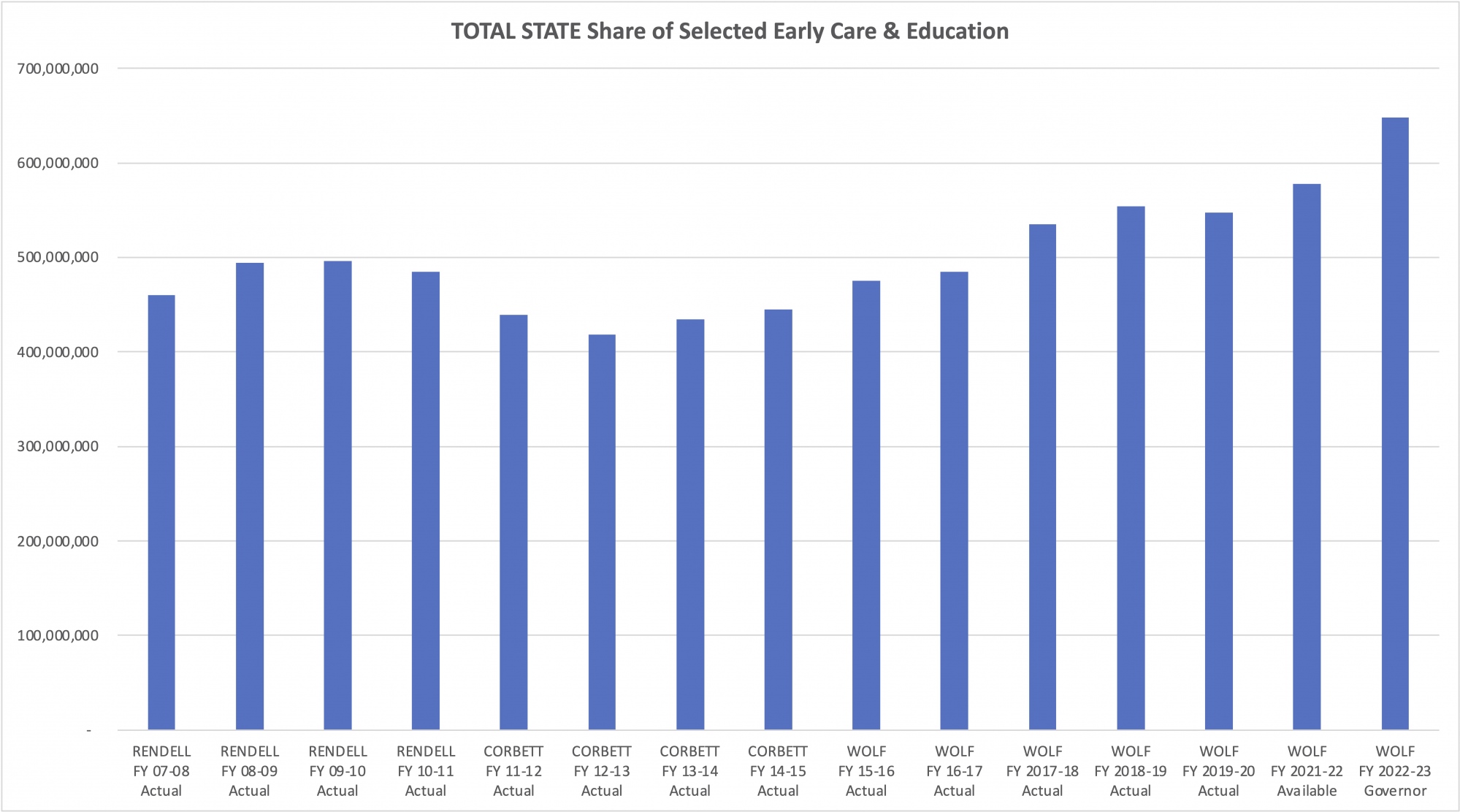
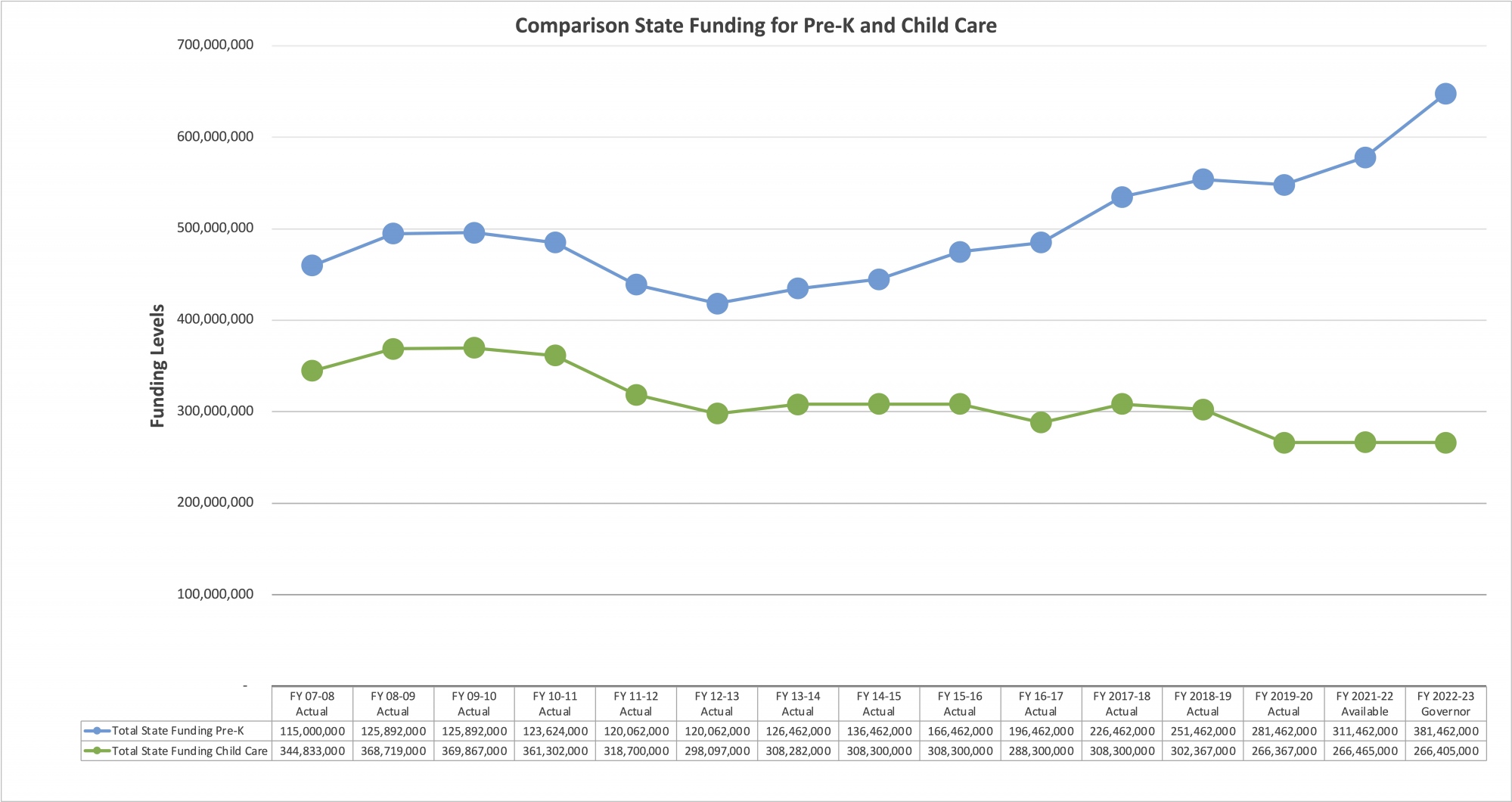
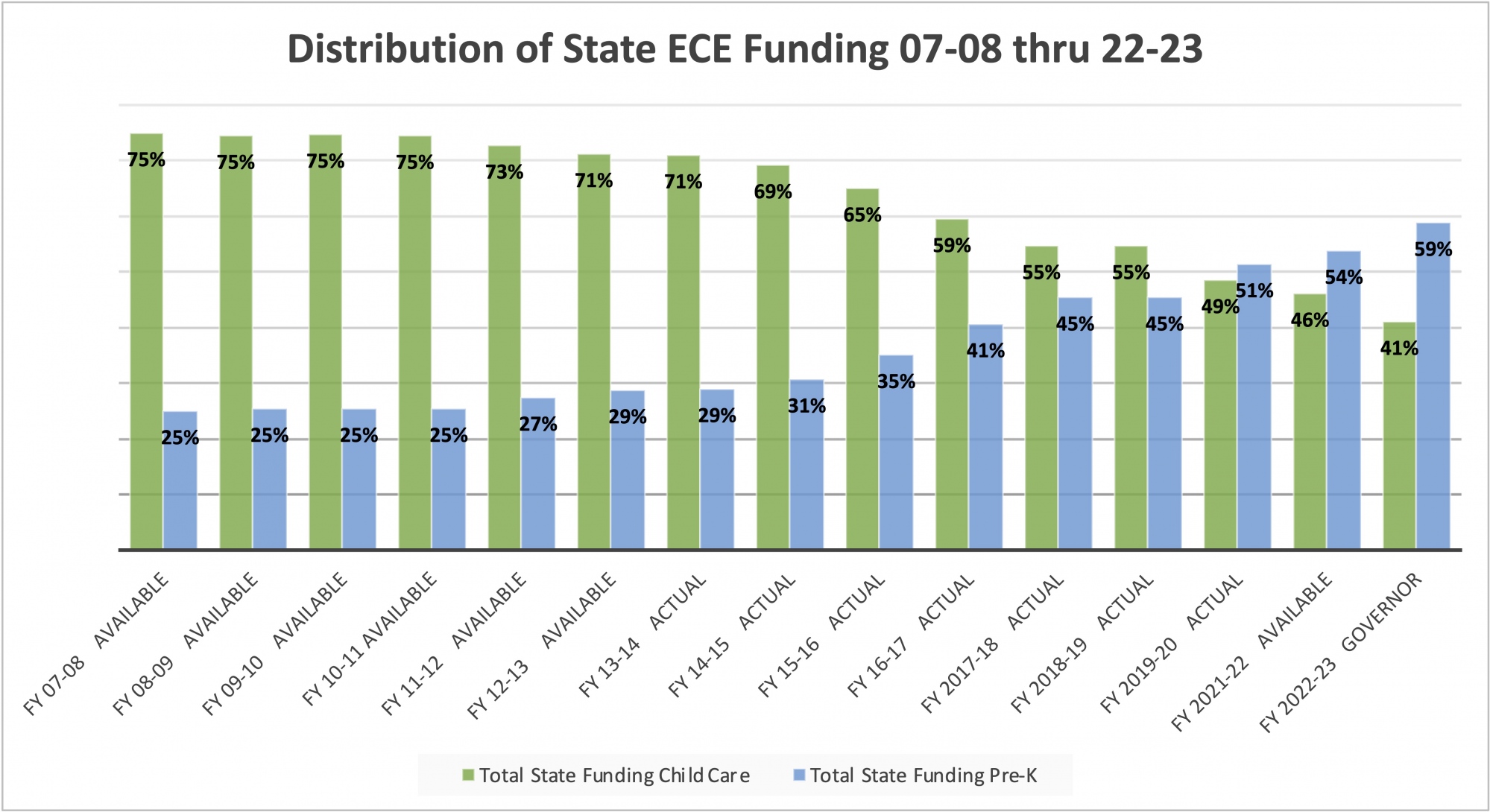
Governor Presents His Final Budget for FY 22-23 | February 8, 2022
Once again, Governor Wolf's budget proposal contains no new state funding for child care, but reiterated the use of Federal American Recovery Plan Act (ARPA) to sustain the Child Care Works base-rate increase to the 60th percentile, maintain a 7% co-pay for families, and an add-on for non-traditional hour care implemented in January 2022. A total of $352.4 million in federal American Rescue Plan child care funds are being used to support these initiatives through the first quarter of the 2024-25 fiscal year, with $128 million specifically dedicated for the FY 2022-23 fiscal year.
The Governor once again proposed a minimum wage increase. His plan would provide pathway to a $15/hour minimum wage with an increase to $12/hour on July 1, 2022. This is the fourth time the Governor has proposed a minimum wage increase. January 31, 2022 minimum wage for state employees increased to $15/hr.
To support the needs of state workers he proposed a program entitled "Child Care Reimagined" which would use $30 million through the Department of General Services to establish child care facilities for state employees and to provide state employees with progressive subsidies to use for child care expenses.
Pre-K was a big winner in this budget with the Governor's proposal of $70 million in new funding. The $60 million increase in Pre-K Counts would create approximately 2,300 new slots as well as increase full-time slots by $1,250 to $10,000 per slot and part-time slots by $625 to $5,000 per slot. OCDEL has proposed a tentative schedule for the applying for the expansions slots. A call for Letters of Intent should be made sometime in the second half of April 2022 with applications being due the end of May/the begging of June. A bidders conference will be held on March 29, 2022. Final numbers of slots to be awarded will be dependent on the final FY 22-23 budget.
The Head Strart Supplemental Assistance Program received a proposed increase of $10 million to clover increase costs. There is no discernable expectation that the funding would create more slots.
Next steps in the budget process will be the Department Secretaries answering questions of the General Assembly during budget hearings. Department of Human Services: Senate 3/7 | House 3/9 | Senate; Department of Education: Senate 3/10 | House 3/7.
FY 2021-2022 Fiscal Code Outlines New Child Care Stabilization Program | June 30, 2021
Using American Rescue Plan funds, a new grant program has been established in the Department of Human Services. More details will be forthcoming, but the Democratic House Appropriations Committee provided this summary.
Child Care Stabilization Program
Article I-H creates the Child Care Stabilization Program in the Department of Human Services. The program will be funded by $728.86 million from the American Rescue Plan Act. DHS is instructed to provide grants, on a rolling basis, to qualified child care providers for their operating costs until either funding is exhausted or the federal deadline for the use of the funding has been reached.
Qualified providers must be either 1) certified by DHS as a child care center, group child care home, or family child care home, or 2) be a relative provider participating in the subsidized child care program as of March 11, 2021. Certified providers must also, on the date of their application, be either open and available to provide care or be temporarily closed due to public health, financial hardship, or other COVID-19 pandemic related reason.
Awarded grants may be used by qualified providers for the following eligible purposes in accordance with Federal law and guidelines:
• Personnel costs, including salaries, benefits, premium pay, and costs related to recruitment and retention
• Rent, payment against a mortgage obligation, utilities, facility maintenance or improvement, and insurance
• Personal protective equipment, cleaning and sanitation supplies and services, and health and safety practices
• Equipment and supply purchases to respond to the COVID-19 pandemic
• Goods or services necessary to maintain or resume childcare services
• Mental health supports for children and employees
Governor Wolf Signs FY 2021-2022 Budget | June 30, 2021
On June 30th, Governor Wolf signed the $40.8 billion Fiscal Year 2021-2022 budget. The budget included a $2.52 billion deposit into the state’s Rainy Day Fund, bringing the balance to a historic $2.76 billion. The record-high boost to that fund was made possible because of surplus revenue plus the $7.3 billion in federal COVID-19 relief dollars the state received. For early learning programs it was a mixed bag.
Winners:
- $30 million increase in high-quality pre-k: $25 million increase for Pre-K Counts and a $5 million increase for the Head Start Supplemental Assistance Program to serve more than 3,200 children.
- Early Intervention Part C (serving 0-3-year-olds) received an increase of $22.18 million, while Part B (serving 3-5-year-olds) saw an increase of $11 million in state funds.
Missed Opportunities:
- No state funding increase for child care line items in the budget (Child Care Services/Child Care Administration).
The Start Strong PA campaign did not ask for an increase in state funding but focused on the allocation of federal stimulus funding. As outlined in the Fiscal Code, ARP Child Care Stabilization Funds were allocated for the full $729 million appropriation to create a Child Care Stabilization Grant Program.
- No state funding increase for voluntary, evidence-based home visiting through the Community-Based Family Centers line.
- The Nurse-Family Partnership line received a minimal increase to restore it to its prior level due to a slight reduction resulting from the state using enhanced Federal Medical Assistance Percentage (FMAP) funding last year.
General Assembly Passes 21-22 Budget -- Awaits Governor's Signature | June 25, 2021
Friday, June 25, 2021, the Pennsylvania General Assembly passed a nearly $40 billion state budget that maintained FY 20-21 investments in child care and included empowering language to enable the Department of Human Services to create the Child Care Stabilization Program from nearly $729 million in ARP child care funds. The program will enable OCDEL to provide grants to child care programs.
Pre-K Counts and the Head Start Supplemental Assistance programs received $25 and $5 million respectively to expand service to an additional 3,200 children.
Wolf Administration Announces Increase to Base Payment Rates for Child Care Providers Participating in Subsidized Child Care | February 1, 2021
The Wolf Administration announced that child care subsidy base rates will rise for the first time since FY 2018-2019 when rates increased 2.5%. Unfortunately, that rate increase barely replaced the reduction in rates that were instituted in FY 2013-2014. In fact, average daily rates paid for infants receiving subsidized child care have increased only 42 cents since FY 2007-2008. The new rate chart issued by the Office of Child Development and Early Learning will be posted at https://www.dhs.pa.gov/Services/Children/Pages/Child-Care-Early-Learning.aspx. New rates go into effect on March 1, 2021.
FY 2020-2021 Budget Finalized | November 23, 2020
Governor Wolf and the General Assembly finalized the state budget, continuing to level fund pre-k, child care and home visiting through the remainder of the FY 20-21. Child care continued to be leveled funded from FY 19-20. In addition, the General Assembly passed legislation to protect child care and pre-k programs from civil liability related to COVID-19. This legislation has been sent to Governor Wolf to sign. OCDEL amended the recently reinstated subsidy policy to better support child care providers who experience a closure or absences related to the 2019 novel coronavirus (COVID-19) while the Proclamation of Disaster Emergency remains in effect. Starting Nov. 1 this policy allows payments to be made based on current enrollment rather than attendance during program and classroom closures and child absences as a result of COVID-related closures.
New FY 2020-2021 Budget Level Funds Child Care through November, but Contains $116 million in Stimulus Funds for Child Care | June 3, 2020
Last week Governor Wolf signed the FY 2020-2021, short-term, $25.75 billion General Fund budget that includes an additional $2.6 billion in federal funding provided through the Coronavirus Aid, Relief, and Economic Security Act, known as the CARES Act.
The budget level funds most state departments through November including child care. The budget will provide current-year levels of funding for Pre-K Counts and Head Start, basic and special education in K-12 schools, and higher education for twelve months.
The budget also includes $116 million in federal CARES Act funding for child care. The Department of Human Services will use the results of the Penn State Harrisburg’s Institute of State and Regional Affairs (ISRA) study on the impacts of COVID-19 on child care providers across Pennsylvania to determine the use of the funding. In addition to the child care investment, Pre-K Counts will receive $7 million and Head Start $2 million from the stimulus funding.
This brings the total child care funding from the stimulus for Pennsylvania to over $222 million. The Governor announced the release of the first $51 million in CARES Act/CCDBG stimulus funding last week. This first round of funding should be released this month through the Early Learning Resource Centers. The Department of Human Services has not announced a timeline for the release of the remaining CARES/CCDBG stimulus funding or the focus of the funding.
Governor Wolf's FY 2020-2021 Child Care Proposal Once Again Relies on Federal Funding | February 7, 2020
While Governor Wolf’s 2020-2021 budget address highlighted child care as a critical workforce support and as one of the priorities of this year’s budget, his budget proposal included no new state funds to increase access or quality. This is deeply disappointing after lawmakers cut $36 million in state funding from the FY 2019-2020 and relied on the influx of new federal funding to make it work. The Governor's Keystone Economic Development and Workforce Command Center in its recently released report identified barriers to employment for Pennsylvania citizens and provided recommendations for action by the governor, Pennsylvania General Assembly, and the private sector. Increasing access to affordable high-quality child care was recommended as a top priority to all three!
Child Care
- $266,475,000 in state funds -- a $108,000 increase above FY 2019-2021 levels
- $15.3 million in federal funds will be used to increase base rates for providers participating in Child Care Works
- $70.4 million in federal funds will be used to address an increase in the minimum wage to $12 an hour (a minimum wage increase must be agreed to by the General Assembly)
- DHS will be looking at restructuring child care co-payments to "ensure the copayment gradually and equitable increases as income increases" to address the benefits cliff
- $12 million to establish a new competitive grant program through the Department of Community and Economic Development (DCED) to address the barriers to work outlined by the Command Center -- child care providers and other partnerships will be encouraged to apply for grant funding to support building non-traditional child care into their business models and incentivize child care workers to provide services during these critical evening, weekend, and overnight hours.
- $25 million in new state funding for Pre-K Counts
- $5 million in new state funding for the Head Start Supplemental Assistance Program
- The 2020-21 budget proposes increasing the state minimum wage to $12 per hour effective July 1, 2020, with annual increases of $0.50 until the minimum wage reaches $15 per hour on July 1, 2026
- The budget also includes Lead Exposure Reduction Program with three specific components that will help reduce lead exposure and poisoning in Pennsylvania children—all-access testing, lead abatement activities, and education and outreach -- child care programs are included in these initiatives.
What you need to know about the fiscal year 2019-2020 Pennsylvania Budget | July 3, 2019
Governor Wolf signed a $34 billion FY 2019-2020 budget that was a mixed bag for Pennsylvania's Early Care and Education providers. On face value, while child care saw increased resources that will address the needs of infants and toddlers by reducing waiting lists, increasing add-ons and providing targeted professional development opportunities for infant and toddler teachers, this increase was accomplished through the use of federal funding. Federal funding will also be used to backfill a $36 million cut in state funding from FY 2018-2019.
As a principal partner in Start Strong PA, PACCA advocated for an increase in the state child care line items based on the unmet needs of children, families and child care programs in the commonwealth. PACCA considers this a missed opportunity to leverage state investments with federal investments at a time when there are significant calls to action to address the needs of working families for high-quality child care.
Child Care
- $6 million cut in state funding for child care services (child care subsidized for low-income families, Keystone STARS supports, professional development) and a $30 million cut in child care assistance for TANF and former TANF families replaced with federal funds.
- $27 million in federal funds to remove 970 infants and toddlers off the child care subsidy waiting list; to increase tiered reimbursement for infants and toddler (proposed 28%); and support apprenticeship programs for infant and toddler teachers.
Other Early Learning Investments in FY 2019-202 Budget
- $25 million increase for Pre-K Counts includes 2.95% per child rate increase over the amount paid in fiscal year 2018-2019 and to serve more children
- $5 million increase for Head Start
- $5 million increase for Family Centers/Home Visiting
- $2.265 increase million Early Intervention ages 0-3
- $15 million increase Early Intervention ages 3-5
- Minimum wage was taken off the table during budget negotiations but may be considered separately.
- Compulsory school age in Pennsylvania was change from 8 to 17 years old to 6 to 18 years old.
- The Educational Improvement Tax Credit (EITC) and the Opportunity Scholarship Tax Credit (OSTC) increased from $160 million to $185 million and $50 million to $55 million respectively.
Governor Wolf's 2019-2020 Executive Budget Uses Influx of Federal Funds to Pay for New Child Care Investments | 2/6/2019
Governor Wolf today laid the groundwork for fiscal year 2019-2020 with an ambitious budget that includes no taxes increases. Using federal funds, the governor recommends providing:
- $10 million to incentivize quality child care for infants and toddlers
$10 million investment of federal funds for child care subsidy will provide a 28 percent increase for infant and toddler daily tiered add-ons for high-quality programs. - $15 million to move infants and toddlers on the waiting list into high-quality child care
$15 million in federal funds to serve an additional 970 infants and toddlers slots in high-quality STAR 3 and 4 child care programs. - $74.2 million to increase rates to help pay for an increase in the minimum wage to $12.00 an hour for staff in child care programs.
- $2 million for professionals serving infants and toddlers in early child care and education programs to participate in education, training, and professional supports for an apprenticeship, or work-based learning (“earn while you learn”) models.
- $50 million for Pre-K Counts and the Head Start Supplemental Assistance program to serve an additional nearly 5,500 children.
2/28/19 | 10AM | House Hearing on the Department of Human Services
3/4/19 | 10AM | House Hearing on the Department of Education (PDE)
3/5/19 | 10AM | Senate Hearing on the Department of Education (PDE)
The budget address and hearings will be broadcast live on https://pcntv.com/.
Department of Human Service Proposes Changes to Child Care Facility Regulations | 10/13/2018
The Department of Human Services (DHS) has proposed changes to the child care certification regulations Chapters 3270, 3280, and 3290. Comments are due by November 13, 2018. Most of the proposed changes to the regulations are required to address changes in the Child Care and Development Block Grant. The changes include:
- Chapters 3270; 3280; 3290. Replacement of the words “day care” with “child care” throughout the body of the regulations.
- Chapters 3270.11 (g); 3280.11 (h); 3290.11 (k). Annual Unannounced Inspections
- Chapter 3290.11. Certification of Family Child Care Homes (FCCH)
- Chapters 3270.11 (c); 3280.11(c); 3290.11 (i). Announced Pre-Certification Inspection
- Chapters 3270.31 (f); 3280.31 (f); 3290.11 (b); 3290.31 (g). Pre-Certification in Ten Health & Safety Areas
- Chapters 3270.27; 3280.26 (a) (b); 3290.24 (a) – (g). Emergency Plan
- Chapters 3270.31 (e); 3280.31 (e); 3290.31 (f). Increased Annual Professional Development
- Chapters 3270.11; 3280.11; 3290.11. Certification Process
- Chapter 3270.4; 3280.4; 3290.4. Definition of the Volunteer
- Chapter 3290. 4. Definition of Relative
- Chapters 3270.131 (a); 3280.131 (a); 3290.131 (a) Health Information
- Chapter 3290.113 (f). Supervision of Children
- Chapter 3290.113 (g). Supervision of Children
PACCA encourages members to submit comments to the Independent Regulatory Review Commission or the Department of Human Services. All comments, suggestions or objections must reference the Regulation Chapter, Number, and Section and Subsection.
Follow this link to PACCA’s comments on the proposed changes to the regulations. The Independent Regulatory Review Commission needs to hear about those regulatory changes with which you agree and those with which you disagree. You can use PACCA’s comments to draft your own unique comments to the proposed changes. We encourage you to modify this template to reflect your own thoughts, expertise, and experience. Please personalize your comments. You may or may not agree with PACCA’s comments, but we hope we have justified our positions.
COMMENTS ARE DUE BY November 13, 2018
Comments may be directly submitted to the Independent Regulatory Review Commission via email to irrc@irrc.state.pa.us
Or to the Department of Human Services …
via email to: RA-PWCCRegChanges@pa.gov
via fax: 717-787-1529
via US mail: Tamula Ferguson Bureau of Certification Services Office of Child Development and Early Learning Department of Human Services 333 Market Street, 6th Floor Harrisburg, PA 17105
Child Care Rate Increase Highlights FY 2018-2019 Pennsylvania Budget | 6/25/2018
Early evening Friday, June 22, 2018, Governor Wolf signed the bi-partisan FY 18-19 Pennsylvania Budget. For the first time in eleven years, the budget includes funds to increase child care base rates using federal funds. The budget also includes $6.8 million in state funds to address the rapidly increasing child care waiting list. Pre-K Counts and Head Start also so increases in funding for the new year. Based on information from the Governor's Office ...
CHILD CARE SERVICES
$6.8 million in increased funds for child care services will be paired with $50 million in federal funding to:
- $6.8 million to serve 1,100 children on the waiting list
- $39 million to increase rates at all levels of care
- $5 million for professional development
- $2 million to establish a one-year pilot to serve infants and toddlers in STAR 3 and STAR 4 programs. The pilot will improve access to and continued enrollment in high-quality early care and education programs for young children
- $4 million for OCDEL compliance with CCDFBG requirements
PRE-K
- $20 million increase for Pre-K Counts
- $5 million increase rates for the Head Start Supplemental Assistance Programs
Governor Wolf's FY 18-19 Budget Includes Increases for Early Learning Programs | updated 3/13/2018
Governor Wolf’s proposed FY 18-19 budget includes significant investments in early learning including $30 million for Pre-K Counts, $10 million for Head Start, $5.3 million for Family Centers, $1.2 million for Nurse Family Partnerships, $11.622 million for Early Intervention (3-5). Early Intervention 0-3 includes an increase of nearly $6.3 million over the enacted FY 17-18 budget. The governor is also proposing $27 million in Child Care Services, which includes a $10 million initiative to reduce child care waiting lists, to increase tiered reimbursement for STAR 2, 3, and 4 providers, the cost to carry existing programs, and a new infant & toddler initiative which will contract for slots in high quality programs.
The Governor’s Executive Budget provides $12.100 million ($10.000 million in state funds) to lift STAR 2, 3, and 4-tiered reimbursement rates to increase STAR 2 rates by 45%, STAR 3 rates by 20%, and STAR 4 rates by 7%.
However, after a promising adjustment to rates that allowed STAR 3 and STAR 4 providers to raise their rates to the Maximum Child Care Allowance (MCCA), the budget doe not address those STAR 2 providers trapped with rates below the MCCA. In addition, no funding is proposed to address child care base subsidy rates that have been stagnant for eleven years.
The Governor also proposed an increase in the minimum wage to $15 an hour which the Independent Fiscal Office reported in a June 2017 report, would cost the Department in excess of $94 million because subsidy payments to child care providers would likely have to increase to offset the higher labor costs. The DHS projected cost did not include the additional payroll costs that providers would be required to pay under a $15/hr minimum wage, and the IFO estimated that those additional costs would be $7.2 million.
FY 2017-2018 Enacted Budget to Governor Wolf's proposed FY 2018-2019 budget
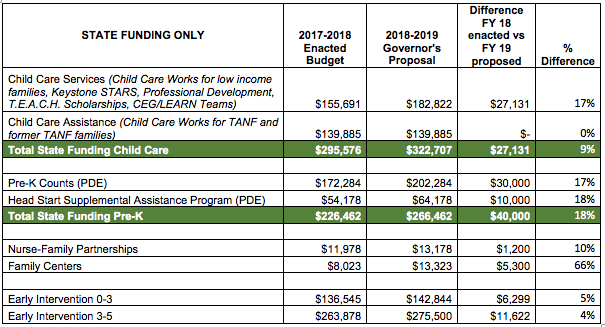
Department of Human Services Issues Information on New Fingerprinting Vendor | posted 12/5/2017
The commonwealth recently transitioned to a new vendor for digital fingerprinting - IDEMIA.
Appointments to be fingerprinted are not required, but pre-registration is required. Once registered, you may walk in during a location’s posted hours of operation, but scheduling an appointment may lead to lesser/no wait times.
In order to pre-register for a FBI background check and/or find a fingerprinting location, applicants should access www.identogo.com. IDEMIA uses service codes when identifying the authorized purpose for why an applicant is being fingerprinted. This ensures applicants are processed for the correct purpose and agency.
Service codes are a required field for all pre-registrations, and the Department of Human Services’ (DHS) codes are provided below. If an applicant does not have a service code, this information will also be available on KeepKidsSafe.pa.gov, under “GET A CLEARANCE.” In addition, a service code look-up tool is available on the PASafeCheck website (uenroll.IdentoGO.com) by following the registration question prompts.
Below are the service codes available for applicants applying under the DHS:
| Service Code | Applicant Type | Department |
| 1KG738 | Child Care Services/Program Employee or Contractor | Department of Human Services |
| 1KG74S | Family Child Care Home Provider | Department of Human Services |
| 1KG78K | Individual >=18 Years in Licensed Child Care Home | Department of Human Services |
The documents also list the allowable valid, unexpired identification documents that applicants can bring as their proof of identity when getting fingerprinted. Please share this information with all affiliates, partners, contracted agencies, and respective applicants. (A list of valid, unexpired documents is available HERE)
In conjunction with the Department of General Services and the Pennsylvania State Police, IDEMIA continues to implement fingerprint locations across Pennsylvania, which is expected to be fully implemented in the coming months.
If you are an agency who was a previous fingerprint site through Cogent and would like your location to remain a commonwealth-affiliated fingerprint site or become a fingerprint site, visit: https://www.identogo.com/partners. At the bottom of that page is a link to IDEMIA’s Partner Inquiry Form (https://survey.morphotrust.com/IdentoGoInquiry.aspx). You can express interest by providing them with your business’ information. Your inquiry will go to their Partner Team for follow up. If there is no need in your specific area, you will be notified of this and IDEMIA will hold onto your information until a need arises. Private Partner agreements are also available if your agency would like the ability to fingerprint employees, but are not offering fingerprinting services to the public.
IDEMIA also offers employers the option to pay for services using a No Charge Authorization Code (NCAC) which is backed by a credit card provided during the account setup. To use this method for payment, the employer must complete and submit the IDEMIANCAC Agreement. The attachment titled “PA – NCAC Package 11.2017 Final.pdf” provides more information regarding this option, as well as the required forms. The forms will also be available on the IDEMIA website at https://www.identogo.com/locations/pennsylvania. The account must be established prior to sending applicants to the fingerprint site.
If you have additional questions, please contact IDEMIA by phone, toll free at (844) 321-2101.
New Legislation Would Require Carbon Monoxide Monitors in Child Care Centers | posted 10/31/2017
Introduced by Senator Wayne D. Fontana (SD42-D), Senate Bill 439 would require carbon monoxide monitors to be installed in buildings housing child care and nursery school programs. It would require that buildings using a fossil fuel-burning heater or appliance, fireplace or an attached garage, have an operational, centrally located and approved carbon monoxide alarm installed in the vicinity of the fossil-fuel-burning heater or fireplace and in every unit that is located on the same story as the fossil-fuel-burning heater or appliance within 18 months of the effective date of this section.
Two years ago, PACCA published an article written by one of its members on how a carbon monoxide monitor averted a tragedy. PACCA worked with the bill sponsor and PennAEYC to modify some of the language.
Pennsylvania Finally has a 2017-2018 Budget | posted 10/31/2017
Monday, October 30, Governor Tom Wolf signed a set of revenue bills that would pay for the expense plan approved by the legislature on June 30. Borrowing and gambling expansion were the primary tools for filling the budget holes. Hopefully, this will mean that funding for the Pre-K Counts expansion will be moving out to providers shortly.
Independent Fiscal Office Issues a Report on Child Care and Early Education Funding in Pennsylvania | posted 9/15/2017
The report provides an overview of the economic impacts of state spending on subsidized child care and no-cost pre-kindergarten programs in Pennsylvania. It is estimated that state funding on Pre-K Counts and Child Care Works (subsidy), combined with CCDFBG funds and the associated parent co-payments yielded $1.2 billion in total economic activity in FY 16-16.
Independent Fiscal Office Estimates that an Increase of Minimum Wage could Cost DHS Over $100 million| posted 7/1/2017
June 30, 2017, the Independent Fiscal Office (IFP) issued a report on Savings and Costs of a $12/Hour Minimum Wage Increase on DHS Programs in response to a legislative request. The IFO reviewed the Department of Human Services' projections for the state savings and costs that could occur if Pennsylvania's minimum wage were to be increased to $12 per hour. The IFO found that there would be no program savings in the Subsidized Child Care Program. While some families would be determined ineligible based on increased income, the waiting list is large enough to fill any slots that become available. However, an increase in the minimum wage would cost the Department in excess of $94 million because subsidy payments to child care providers would likely have to increase to offset the higher labor costs. The DHS projected cost did not include the additional payroll costs that providers would be required to pay under a $15/hr minimum wage, and the IFO estimates that those additional costs would be $7.2 million.
House & Senate Agree to Restore Funding to Child Care | posted 7/1/2017
Hundreds of emails, phone calls, office visits, and letters by early learning advocates helped secure new investments in early learning during this year’s very challenging budget process.
Just hours before the end of the fiscal year, the Pennsylvania House voted to concur with the Pennsylvania Senate's changes to the FY 2017-2018 spending plan of nearly $32 billion, sending it to Governor Wolf for his signature. The budget passed 43-7 in the Senate and 173-27 in the House. However, as we entered the new fiscal year policymakers have not yet agreed on to fund it.
Child Care Services | Increase of $20 million to $155.691 million
Restores cut made to Child Care Services in FY 16-17, however, $15 million below Governor Wolf’s request. DHS will use $15.195 million in CCDBG funds to make up the difference which will enable OCDEL to remove 1,800 from the waiting list. Keystone STARS revisioning and tiered reimbursement initiatives are supported.
Child Care Assistance | Decrease of $12.7 million to $139.855 million
Decreases Child Care Assistance funding used to provide child care subsidy to families currently receiving Temporary Assistance for Needy Families (TANF) and former TANF recipients. Prior year funding will be used to make up the difference. As a result, no children will be impacted.
Pre-K | Increase of $30 million to $522.038 million
Funding for Pre-K Counts increases by an additional $25 million to $172.284 million. Head Start gains an additional $5 million, bringing total state funding to $54.178 million.
Home Visiting programs | Increase of $4.765 million to $20 million
The budget provides $4.765 million in new state funding for Family Centers while maintaining the $11.978 million appropriation for Nurse Family Partnerships.
Early Intervention | Increase $19 million to $440.423 million
Both Early Intervention 0-3 and 3-5 received increases at levels proposed by Governor Wolf. The request for Early Intervention 0-3 includes nearly $6 million to replace lost federal funding.
PA House passes a budget bill that would slash $28 million in existing child care funding in FY 2017-2018
The House of Representatives in Harrisburg advanced a draft budget (HB 218) by 114-84 that reduces the governor's proposed early learning investments. The bill did not include the governor’s proposal to increase child care by $35 million, but reduces funding by $28 million – a total $63 million cut. In addition to cutting child care, the Community-Based Family Center and Nurse-Family Partnerships current appropriations are also proposed to be cut in the new year. Additionally, HB 218 fails to include the governor’s proposed $9 million allocation for evidence-based home visiting. The Governor's proposed $75 million for pre-k is cut to $25 million, $20 million for Pre-K Counts and $5 million for Head Start.
2017 Budget Hearings: Child Care Questions
In February and March 2017, the Pennsylvania House and Senate Appropriation Committees held budget hearings in response to Governor Wolf’s proposed budget. Administration officials and Department Secretaries fielded questions from legislators.
In House Appropriations Committee hearing on the Department of Human Services (DHS) Representatives asked Secretary Ted Dallas and David Spishock, DHS Budget Office, a number of questions about child care. When asked why child care rates have not increased since 2007 and how DHS can ensure sufficient support. Sec. Dallas remarked the approach has been to pay for and reimburse based on quality. Sec. Dallas indicated that changes in redetermination for child care from 6 months to 12 months, as well as recognized savings from reduced need for services that could result from the proposed increases in the minimum wage, had both been taken into account in the proposed budget. Sec. Dallas was asked about the changes to the Keystone STARS system and if more child care facilities will be eligible in the new year. Sec. Dallas said the program is used to measure service quality and includes higher reimbursement rates for better ratings. He also mentioned ongoing reform efforts for the system.
In the Senate, a member asked about child care rates in the context of the proposed minimum wage increase. Sec. Dallas suggested that it is unlikely child care rates would increase without an increase in minimum wage.
Governor Wolf Proposes $35 million Increase to Child Care in FY 2017-2018
Governor Wolf’s proposed FY 17-18 budget includes significant investments in early learning including $65 million for Pre-K Counts, $10 million for Head Start, $8.7 million for Home Visiting and $13 million for Early Intervention (B-5). The governor is also proposing $35 million in Child Care Services, which includes a $10 million initiative to reduce child care waiting lists, funding to replace reductions in federal funding, and cost to carry existing programs; however, no funding is proposed to address child care subsidy rates that have been stagnant for ten years.
OCDEL plans to increase tiered reimbursement by approximately 23% for STAR 3 and STAR 4 providers, maintaining tiered reimbursement and Merit Awards for STAR 2 providers. In a recent issue of the BUILD Early Learning News, it was noted that the change was a result of analysis indicating “… there is such an inequitable distribution of resources for at-risk children that programs serving the minimum percentage of at-risk children receive more than ten times the amount per at-risk child than programs serving 90-100 percent enrolled children with IEPs or receiving Child Care Works subsidy.”
Proposed Tiered Reimbursement Increases – What it could look like
Disclaimer: The numbers below were calculated by PACCA and not provided by OCDEL or the PA Key. They based on information in the proposed FY 17-18 DHS budget increasing tiered reimbursement rates by 23% for STAR 3 & STAR 4 providers. The amounts are approximated.
In a STAR 4 program in Montgomery County, for a FT infant receiving subsidized child care a provider could be paid up to the Maximum Child Care Allowance (MCCA) of $45.35/day plus $10.30/day in tiered reimbursement = $55.65/day x 5 days x 52 weeks = $14,469.
In a STAR 4 program in Dauphin County, for a FT infant receiving subsidized child care a provider could be paid up to the Maximum Child Care Allowance (MCCA) of $35.65/day plus $10.30/day in tiered reimbursement = $45.95/day x 5 days x 52 weeks = $11,947.
Increases to STARS Add-Ons Welcome News to Providers for 2016-2017
The Governor's signature on portions of the FY 15-16 budget will release much needed incentives for STAR 3 and STAR 4 programs who will see the add-on rates for children receiving Child Care Works subsidy increase on average $2.45 for the STAR 3 full-time rate and $3.05 for the STAR 4 full-time rate. The budget also increases subsidy add-on rates for STAR 2, 3, and 4 programs serving infants and toddlers. For 2015-16, STARS add-on subsidy rates have been delineated by age group (infant, young/older toddler, preschooler) to better reflect the cost of care for each age group. Programs will receive the increases retroactive to August 1, 2015, with payments disbursed in March.
FY 2016-2017 Cuts $20 million from Child Care
Governor Signs FY 2014-2015 Budget
While the General Assembly is not happy with how the FY 14-15 Budget was enacted, early learning investments survived even with a potential $1.5 billion shortfall on the horizon for next year. Below is how the early learning lines made out:
- Pre-K Counts ($97,284,000) received the $10m increase proposed by the governor.
- Head Start Supplemental ($39,178,000) is funded at the 13-14 level, as proposed by the governor.
- PDE Early Intervention received the increase proposed by the governor.
DPW Early Intervention is funded at the 13-14 level. This is the same as the House proposal, which is a reduction from what the governor proposed. Per OCDEL staff, they will be using unspent federal funds to plug this hole so the level-funding of the state appropriation won't have a negative impact. - Child Care Services ($155,691,000) governor's proposed $18K increase is included. Also, the federal CCDBG line was increased to the level proposed by the governor for the waiting list initiative.
- Child Care Assistance ($152,609,000) is funded at the 13-14 level, as proposed by the governor.
- Nurse Family Partnership and Family Centers (Parents as Teachers home visiting model funded through this line) level-funded, per governor's proposal.
Revenue Shortfalls Plague PA Budget
Pennsylvania revenues were down $328 million in April leaving $506 million budget gap so far for FY 2013-2014. Governor Corbett's FY 2014-2015 could face as much as $1 billion shortfall. Pennsylvania has been warned by major credit rating agencies that pension debt and budget issues could result in the downgrading Pennsylvania's credit rating, making it more expensive for the state to borrow money. As a result, the Governor and General Assembly will need to find a way to balance this year's budget and look closely at both revenue and expenses for FY 2014-2015. This will all need to happen in June since the General Assembly recesses until after the Primary Election.
Budget Hearings & Child Care
Both the Senate and House Appropriations Committees held their budget hearings for the Department of Public Welfare this week. The agenda in both hearing focused extensively on Medicaid expansion, Healthy PA, and the Affordable Care Act. In the Senate hearing, Senator Judy Schwank (D-Berks) asked about waiting lists and noted that providers in her district were reporting that their enrollments were dropping or parents were cutting back their hours because child care was so expensive. She questioned putting money into waiting lists when lists were so low. DPW Secretary Beverly Mackereth agreed that they were low now. Speaking further on child care, the Secretary noted, "We are investing in quality ... through strategic investments in programs like Keystone STARS and Rising STARS ... (We are telling providers) If you want additional dollars you've got to improve your quality." Sen. Schwank shared that her providers are engaged.
House members asked about waiting lists, the tuition assistance program and rates. As noted in the Senate hearing, the Secretary confirmed that the budget is using federal funds to reduce the waiting list, which is low now, but fluctuates. She shared that the budget funds the tuition assistance program at the same level as this year; overall Rising Stars/Keystone STARS is proposed to be level funded in FY 14-15. When asked about the rate freeze that allows new providers to receive potentially higher rates than existing providers, she responded that "we are paying for quality" ... through Keystone STARS.
Governor Corbett FY 14-15 Budget Proposal -- Selected Early Learning Investments
On February 4, 2014, Governor Corbett shared his budget proposal for FY 2014-2015 with the Pennsylvania General Assembly. He noted Pennsylvania's winning of the Early Learning Challenge Grant.
The Investment
CHILD CARE ASSISTANCE
State funding for Child Care Assistance for TANF and former TANF families remains at FY 2013-2014 levels of $152.609. Approximately 55,000 children receive assistance through this program each month.
CHILD CARE SERVICES
State funding for Child Care Services was increased by $18,000 for FY 2013-2014 for $155.691 million. The Governor proposes using $15 million in new federal funding from Child Care and Development Block Grant to provide services for 2,895 additional children from low-income families. Approximately, 64,500 children from low-income families are expected to be served each month. This line item also funds Keystone STARS and the Rising STARS Tuition Assistance Program.
PENNSYLVANIA PRE-K COUNTS
Increases state funding for Pre-K Counts by $10 million dollars from $87.284 million to $97.284 million to serve an additional 1,670 children.
HEAD START SUPPLEMENTAL ASSISTANCE PROGRAM
Maintains state funding for Head Start at FY 2013-2014 levels of $39.178 million
In addition ...
EARLY INTERVENTION (0-3)
Early Intervention (0-3) was increased by $4.192 to $132.166 million.
EARLY INTERVENTION (3-5)
Early Intervention (3-5) was increased $841,000 to $237.516 million.
What’s Next
The General Assembly will hold budget hearings. It is imperative that early childhood advocates know that there a huge gap still remains between the resource proposed and the resources need to ensure that Pennsylvania's children and families have access to high-quality early learning services.
FY 13-14 Budget Boosts Funding for Child Care, Pre-K Counts and Head Start
With hours to go before the midnight deadline and the start of the new fiscal year, Governor Corbett signed the $28.4 billion FY 2013-2014 Pennsylvania Budget. Overall, early childhood education funding saw increases in Pre-K Counts, Head Start, and Child Care. The FY 2013-2014 budget sustains increases to Pre-K Counts ($4.5 million) and the Head Start Supplemental Assistance Program ($1.9 million). Child Care Services funding increased by $14.3 million from the FY 2012-2013 budget. This amount included $4.1 million savings from the consolidation of the CCIS that was moved from the Child Care Assistance line item to Child Care Services, $3 million from the Governor's budget request and an additional $7.2 million (that will help buffer any losses of federal funding due to sequestration). Child Care Assistance lost $4.1 million, however, this funding was moved to Child Care Services and will help the Commonwealth reduce waiting lists allowing an additional 1,400 - 1,600 children to be served.
Governor's 2013-2014 Budget A Down Payment on Early Learning
On February 5, 2013, Governor Corbett presented his FY 2013-2014 budget proposal to the Pennsylvania General Assembly. Statements from his Budget Address:
- "I propose adding another $6.4 million dollars toward our Pre-K Counts and the Head Start Supplemental Assistance programs. This money gives an additional 3,200 children, and their families, access to quality full and part-day programs as well as summer kindergarten readiness programs."
- "Why do we want to spend more on these programs? Because every child in Pennsylvania deserves an equal start in life, and I intend to see that promise kept."
- "When it comes to children, we must spare no effort."
- "My budget proposes that we assist more than 210,000 low-income families and enable 1,400 children now on waiting lists to receive child-care assistance."
- "This budget includes more than $8 million dollars in additional resources to provide health care coverage to more than 9,300 additional children through CHIP."
The Investment
CHILD CARE SERVICES (child care assistance for low-income families, Keystone STARS, etc.
- $7.119 million to expand subsidized child care services for approximately 1,400 additional children of low-income families. (Include $3 million in annualized savings from the consolidation of CCIS are reinvested to provide subsidized child care services)
- $3 million for child care quality enhancements to further improve the quality of child care services through enhanced incentives for providers participating in Rising Stars Initiative.
- $148,488, 000 in total state funding proposed for Child Care Services in FY 2013-2014.
CHILD CARE ASSISTANCE (child care subsidy for TANF & Former TANF families)
- $4.119 million reduction in this line item as a result of annualized saving from the consolidation of CCIS. Savings moved to Child Care Services.
- $152,609,000 total state funding proposed for Child Care Assistance for FY 2013-2014.
PENNSYLVANIA PRE-K COUNTS
- $4.5 million to provide additional resources in the Pre-K Counts program to serve an additional 580 children in full- and part-day programs. (Total proposed state funding $87,284,000)
HEAD START SUPPLEMENTAL ASSISTANCE PROGRAM
- $1.9 million to serve an additional 210 children in early learning programs. (Total proposed state funding $39,178,000)
What’s Next
As the General Assembly works on the budget, we’ll need to make sure that legislators know the impact of early learning programs and that, as budget negotiations move forward, child care and early learning funding isn’t cut.




